Academic Study Skills: Reflective Report on Team Project Experience
VerifiedAdded on 2020/11/12
|8
|2438
|119
Report
AI Summary
This report presents a reflective analysis of academic study skills, focusing on the author's experiences with project work and team collaboration. The introduction highlights the importance of academic projects in enhancing skills such as time management, in-depth investigation, and data analysis. The author uses the Gibbs Reflective Model to describe their journey, from initial project anxiety to successful completion, emphasizing the ups and downs of the process. The report discusses the challenges faced, including time constraints and funding limitations, and the strategies employed to overcome them, such as adopting agile methodologies. Key takeaways include the development of team-working skills, the ability to manage challenges, and the importance of self-assessment. The report concludes with plans for future skill development, including taking management classes and improving research skills to achieve career goals.
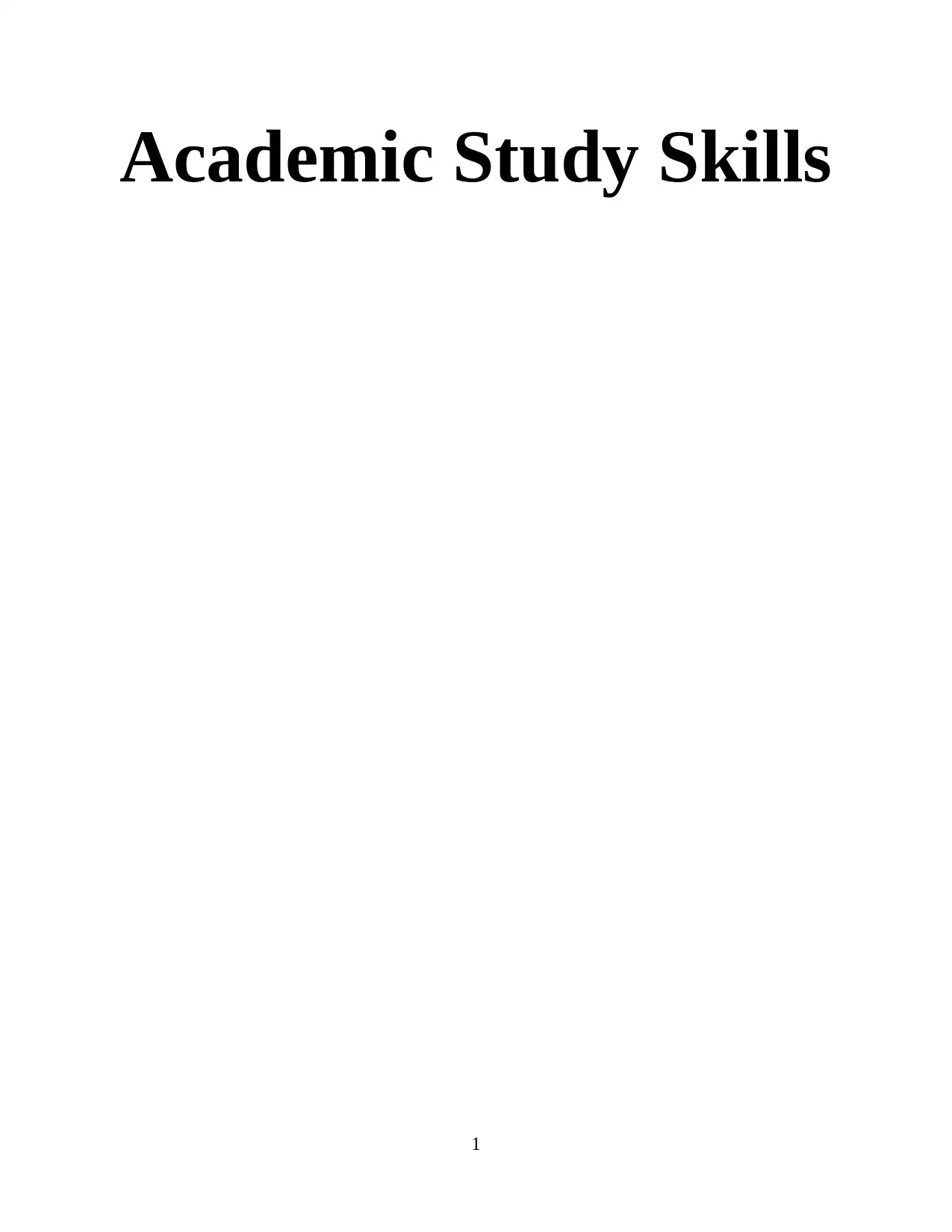
Academic Study Skills
1
1
Paraphrase This Document
Need a fresh take? Get an instant paraphrase of this document with our AI Paraphraser
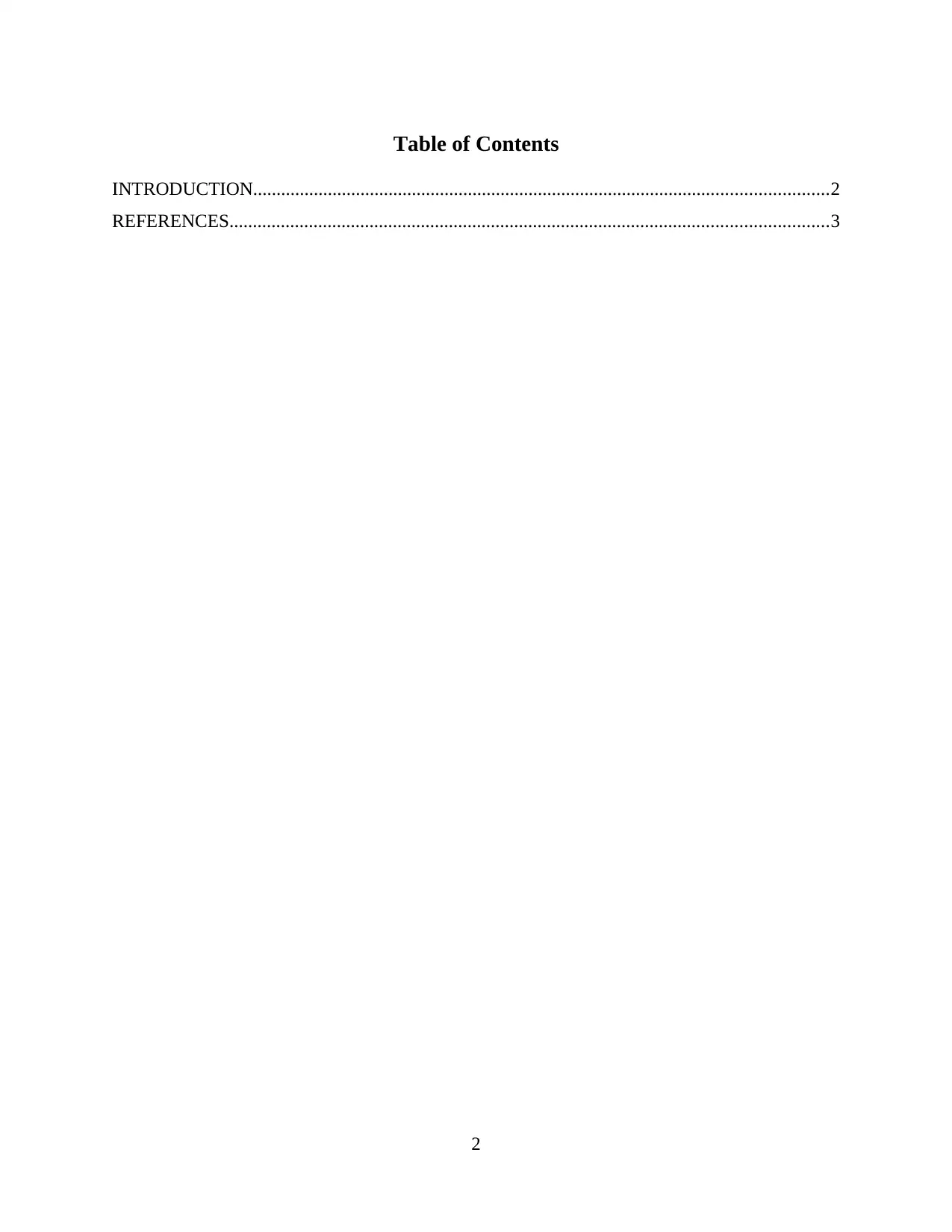
Table of Contents
INTRODUCTION...........................................................................................................................2
REFERENCES................................................................................................................................3
2
INTRODUCTION...........................................................................................................................2
REFERENCES................................................................................................................................3
2
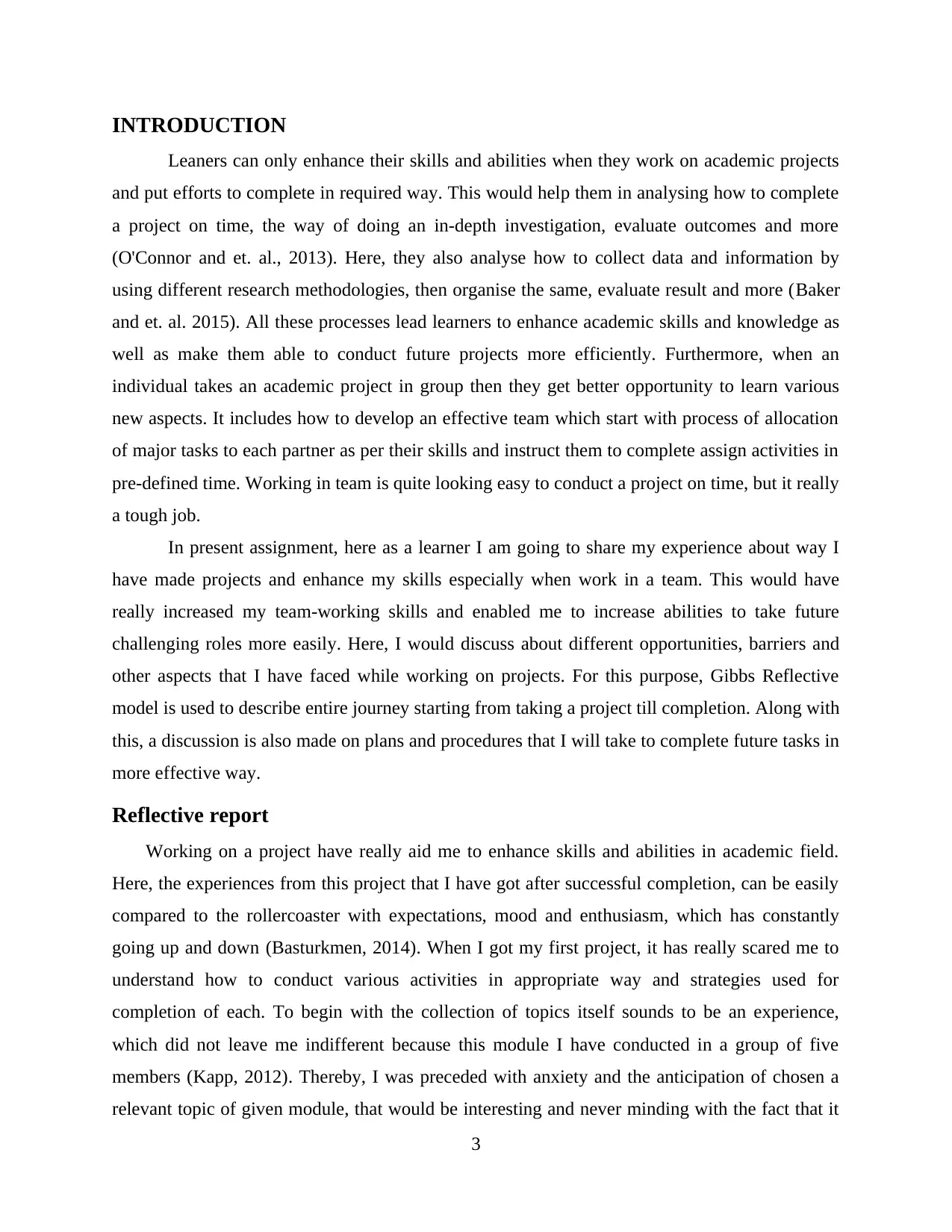
INTRODUCTION
Leaners can only enhance their skills and abilities when they work on academic projects
and put efforts to complete in required way. This would help them in analysing how to complete
a project on time, the way of doing an in-depth investigation, evaluate outcomes and more
(O'Connor and et. al., 2013). Here, they also analyse how to collect data and information by
using different research methodologies, then organise the same, evaluate result and more (Baker
and et. al. 2015). All these processes lead learners to enhance academic skills and knowledge as
well as make them able to conduct future projects more efficiently. Furthermore, when an
individual takes an academic project in group then they get better opportunity to learn various
new aspects. It includes how to develop an effective team which start with process of allocation
of major tasks to each partner as per their skills and instruct them to complete assign activities in
pre-defined time. Working in team is quite looking easy to conduct a project on time, but it really
a tough job.
In present assignment, here as a learner I am going to share my experience about way I
have made projects and enhance my skills especially when work in a team. This would have
really increased my team-working skills and enabled me to increase abilities to take future
challenging roles more easily. Here, I would discuss about different opportunities, barriers and
other aspects that I have faced while working on projects. For this purpose, Gibbs Reflective
model is used to describe entire journey starting from taking a project till completion. Along with
this, a discussion is also made on plans and procedures that I will take to complete future tasks in
more effective way.
Reflective report
Working on a project have really aid me to enhance skills and abilities in academic field.
Here, the experiences from this project that I have got after successful completion, can be easily
compared to the rollercoaster with expectations, mood and enthusiasm, which has constantly
going up and down (Basturkmen, 2014). When I got my first project, it has really scared me to
understand how to conduct various activities in appropriate way and strategies used for
completion of each. To begin with the collection of topics itself sounds to be an experience,
which did not leave me indifferent because this module I have conducted in a group of five
members (Kapp, 2012). Thereby, I was preceded with anxiety and the anticipation of chosen a
relevant topic of given module, that would be interesting and never minding with the fact that it
3
Leaners can only enhance their skills and abilities when they work on academic projects
and put efforts to complete in required way. This would help them in analysing how to complete
a project on time, the way of doing an in-depth investigation, evaluate outcomes and more
(O'Connor and et. al., 2013). Here, they also analyse how to collect data and information by
using different research methodologies, then organise the same, evaluate result and more (Baker
and et. al. 2015). All these processes lead learners to enhance academic skills and knowledge as
well as make them able to conduct future projects more efficiently. Furthermore, when an
individual takes an academic project in group then they get better opportunity to learn various
new aspects. It includes how to develop an effective team which start with process of allocation
of major tasks to each partner as per their skills and instruct them to complete assign activities in
pre-defined time. Working in team is quite looking easy to conduct a project on time, but it really
a tough job.
In present assignment, here as a learner I am going to share my experience about way I
have made projects and enhance my skills especially when work in a team. This would have
really increased my team-working skills and enabled me to increase abilities to take future
challenging roles more easily. Here, I would discuss about different opportunities, barriers and
other aspects that I have faced while working on projects. For this purpose, Gibbs Reflective
model is used to describe entire journey starting from taking a project till completion. Along with
this, a discussion is also made on plans and procedures that I will take to complete future tasks in
more effective way.
Reflective report
Working on a project have really aid me to enhance skills and abilities in academic field.
Here, the experiences from this project that I have got after successful completion, can be easily
compared to the rollercoaster with expectations, mood and enthusiasm, which has constantly
going up and down (Basturkmen, 2014). When I got my first project, it has really scared me to
understand how to conduct various activities in appropriate way and strategies used for
completion of each. To begin with the collection of topics itself sounds to be an experience,
which did not leave me indifferent because this module I have conducted in a group of five
members (Kapp, 2012). Thereby, I was preceded with anxiety and the anticipation of chosen a
relevant topic of given module, that would be interesting and never minding with the fact that it
3
⊘ This is a preview!⊘
Do you want full access?
Subscribe today to unlock all pages.

Trusted by 1+ million students worldwide
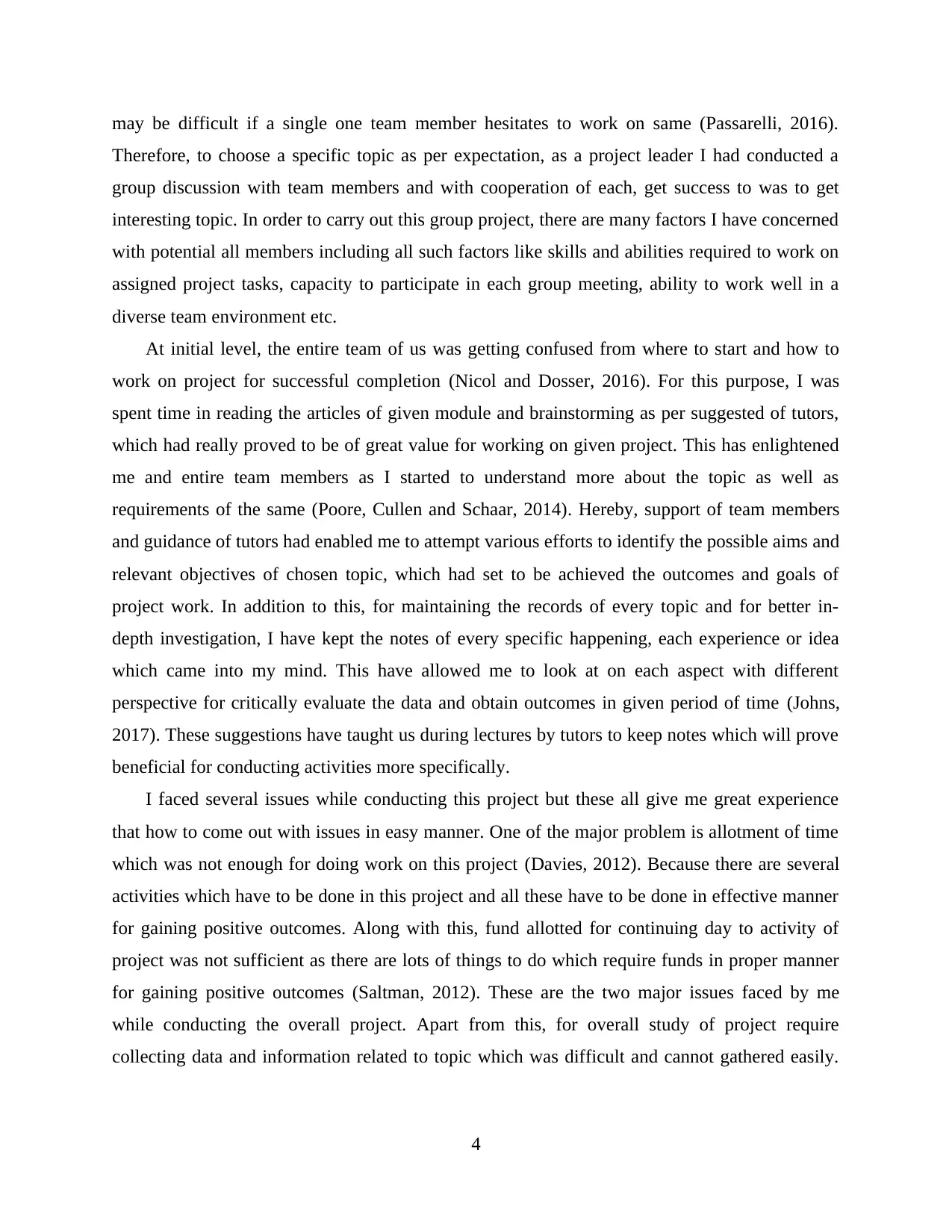
may be difficult if a single one team member hesitates to work on same (Passarelli, 2016).
Therefore, to choose a specific topic as per expectation, as a project leader I had conducted a
group discussion with team members and with cooperation of each, get success to was to get
interesting topic. In order to carry out this group project, there are many factors I have concerned
with potential all members including all such factors like skills and abilities required to work on
assigned project tasks, capacity to participate in each group meeting, ability to work well in a
diverse team environment etc.
At initial level, the entire team of us was getting confused from where to start and how to
work on project for successful completion (Nicol and Dosser, 2016). For this purpose, I was
spent time in reading the articles of given module and brainstorming as per suggested of tutors,
which had really proved to be of great value for working on given project. This has enlightened
me and entire team members as I started to understand more about the topic as well as
requirements of the same (Poore, Cullen and Schaar, 2014). Hereby, support of team members
and guidance of tutors had enabled me to attempt various efforts to identify the possible aims and
relevant objectives of chosen topic, which had set to be achieved the outcomes and goals of
project work. In addition to this, for maintaining the records of every topic and for better in-
depth investigation, I have kept the notes of every specific happening, each experience or idea
which came into my mind. This have allowed me to look at on each aspect with different
perspective for critically evaluate the data and obtain outcomes in given period of time (Johns,
2017). These suggestions have taught us during lectures by tutors to keep notes which will prove
beneficial for conducting activities more specifically.
I faced several issues while conducting this project but these all give me great experience
that how to come out with issues in easy manner. One of the major problem is allotment of time
which was not enough for doing work on this project (Davies, 2012). Because there are several
activities which have to be done in this project and all these have to be done in effective manner
for gaining positive outcomes. Along with this, fund allotted for continuing day to activity of
project was not sufficient as there are lots of things to do which require funds in proper manner
for gaining positive outcomes (Saltman, 2012). These are the two major issues faced by me
while conducting the overall project. Apart from this, for overall study of project require
collecting data and information related to topic which was difficult and cannot gathered easily.
4
Therefore, to choose a specific topic as per expectation, as a project leader I had conducted a
group discussion with team members and with cooperation of each, get success to was to get
interesting topic. In order to carry out this group project, there are many factors I have concerned
with potential all members including all such factors like skills and abilities required to work on
assigned project tasks, capacity to participate in each group meeting, ability to work well in a
diverse team environment etc.
At initial level, the entire team of us was getting confused from where to start and how to
work on project for successful completion (Nicol and Dosser, 2016). For this purpose, I was
spent time in reading the articles of given module and brainstorming as per suggested of tutors,
which had really proved to be of great value for working on given project. This has enlightened
me and entire team members as I started to understand more about the topic as well as
requirements of the same (Poore, Cullen and Schaar, 2014). Hereby, support of team members
and guidance of tutors had enabled me to attempt various efforts to identify the possible aims and
relevant objectives of chosen topic, which had set to be achieved the outcomes and goals of
project work. In addition to this, for maintaining the records of every topic and for better in-
depth investigation, I have kept the notes of every specific happening, each experience or idea
which came into my mind. This have allowed me to look at on each aspect with different
perspective for critically evaluate the data and obtain outcomes in given period of time (Johns,
2017). These suggestions have taught us during lectures by tutors to keep notes which will prove
beneficial for conducting activities more specifically.
I faced several issues while conducting this project but these all give me great experience
that how to come out with issues in easy manner. One of the major problem is allotment of time
which was not enough for doing work on this project (Davies, 2012). Because there are several
activities which have to be done in this project and all these have to be done in effective manner
for gaining positive outcomes. Along with this, fund allotted for continuing day to activity of
project was not sufficient as there are lots of things to do which require funds in proper manner
for gaining positive outcomes (Saltman, 2012). These are the two major issues faced by me
while conducting the overall project. Apart from this, for overall study of project require
collecting data and information related to topic which was difficult and cannot gathered easily.
4
Paraphrase This Document
Need a fresh take? Get an instant paraphrase of this document with our AI Paraphraser
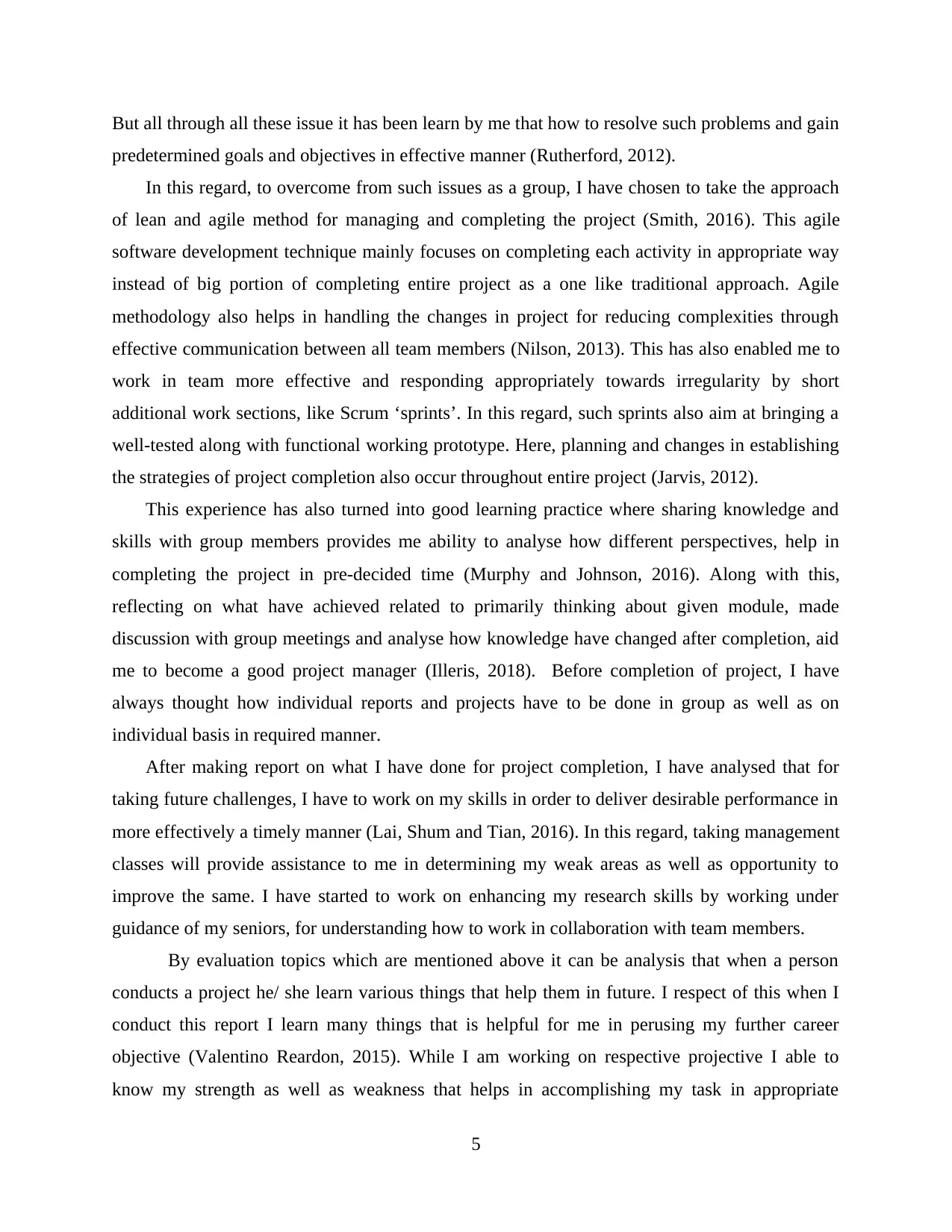
But all through all these issue it has been learn by me that how to resolve such problems and gain
predetermined goals and objectives in effective manner (Rutherford, 2012).
In this regard, to overcome from such issues as a group, I have chosen to take the approach
of lean and agile method for managing and completing the project (Smith, 2016). This agile
software development technique mainly focuses on completing each activity in appropriate way
instead of big portion of completing entire project as a one like traditional approach. Agile
methodology also helps in handling the changes in project for reducing complexities through
effective communication between all team members (Nilson, 2013). This has also enabled me to
work in team more effective and responding appropriately towards irregularity by short
additional work sections, like Scrum ‘sprints’. In this regard, such sprints also aim at bringing a
well-tested along with functional working prototype. Here, planning and changes in establishing
the strategies of project completion also occur throughout entire project (Jarvis, 2012).
This experience has also turned into good learning practice where sharing knowledge and
skills with group members provides me ability to analyse how different perspectives, help in
completing the project in pre-decided time (Murphy and Johnson, 2016). Along with this,
reflecting on what have achieved related to primarily thinking about given module, made
discussion with group meetings and analyse how knowledge have changed after completion, aid
me to become a good project manager (Illeris, 2018). Before completion of project, I have
always thought how individual reports and projects have to be done in group as well as on
individual basis in required manner.
After making report on what I have done for project completion, I have analysed that for
taking future challenges, I have to work on my skills in order to deliver desirable performance in
more effectively a timely manner (Lai, Shum and Tian, 2016). In this regard, taking management
classes will provide assistance to me in determining my weak areas as well as opportunity to
improve the same. I have started to work on enhancing my research skills by working under
guidance of my seniors, for understanding how to work in collaboration with team members.
By evaluation topics which are mentioned above it can be analysis that when a person
conducts a project he/ she learn various things that help them in future. I respect of this when I
conduct this report I learn many things that is helpful for me in perusing my further career
objective (Valentino Reardon, 2015). While I am working on respective projective I able to
know my strength as well as weakness that helps in accomplishing my task in appropriate
5
predetermined goals and objectives in effective manner (Rutherford, 2012).
In this regard, to overcome from such issues as a group, I have chosen to take the approach
of lean and agile method for managing and completing the project (Smith, 2016). This agile
software development technique mainly focuses on completing each activity in appropriate way
instead of big portion of completing entire project as a one like traditional approach. Agile
methodology also helps in handling the changes in project for reducing complexities through
effective communication between all team members (Nilson, 2013). This has also enabled me to
work in team more effective and responding appropriately towards irregularity by short
additional work sections, like Scrum ‘sprints’. In this regard, such sprints also aim at bringing a
well-tested along with functional working prototype. Here, planning and changes in establishing
the strategies of project completion also occur throughout entire project (Jarvis, 2012).
This experience has also turned into good learning practice where sharing knowledge and
skills with group members provides me ability to analyse how different perspectives, help in
completing the project in pre-decided time (Murphy and Johnson, 2016). Along with this,
reflecting on what have achieved related to primarily thinking about given module, made
discussion with group meetings and analyse how knowledge have changed after completion, aid
me to become a good project manager (Illeris, 2018). Before completion of project, I have
always thought how individual reports and projects have to be done in group as well as on
individual basis in required manner.
After making report on what I have done for project completion, I have analysed that for
taking future challenges, I have to work on my skills in order to deliver desirable performance in
more effectively a timely manner (Lai, Shum and Tian, 2016). In this regard, taking management
classes will provide assistance to me in determining my weak areas as well as opportunity to
improve the same. I have started to work on enhancing my research skills by working under
guidance of my seniors, for understanding how to work in collaboration with team members.
By evaluation topics which are mentioned above it can be analysis that when a person
conducts a project he/ she learn various things that help them in future. I respect of this when I
conduct this report I learn many things that is helpful for me in perusing my further career
objective (Valentino Reardon, 2015). While I am working on respective projective I able to
know my strength as well as weakness that helps in accomplishing my task in appropriate
5
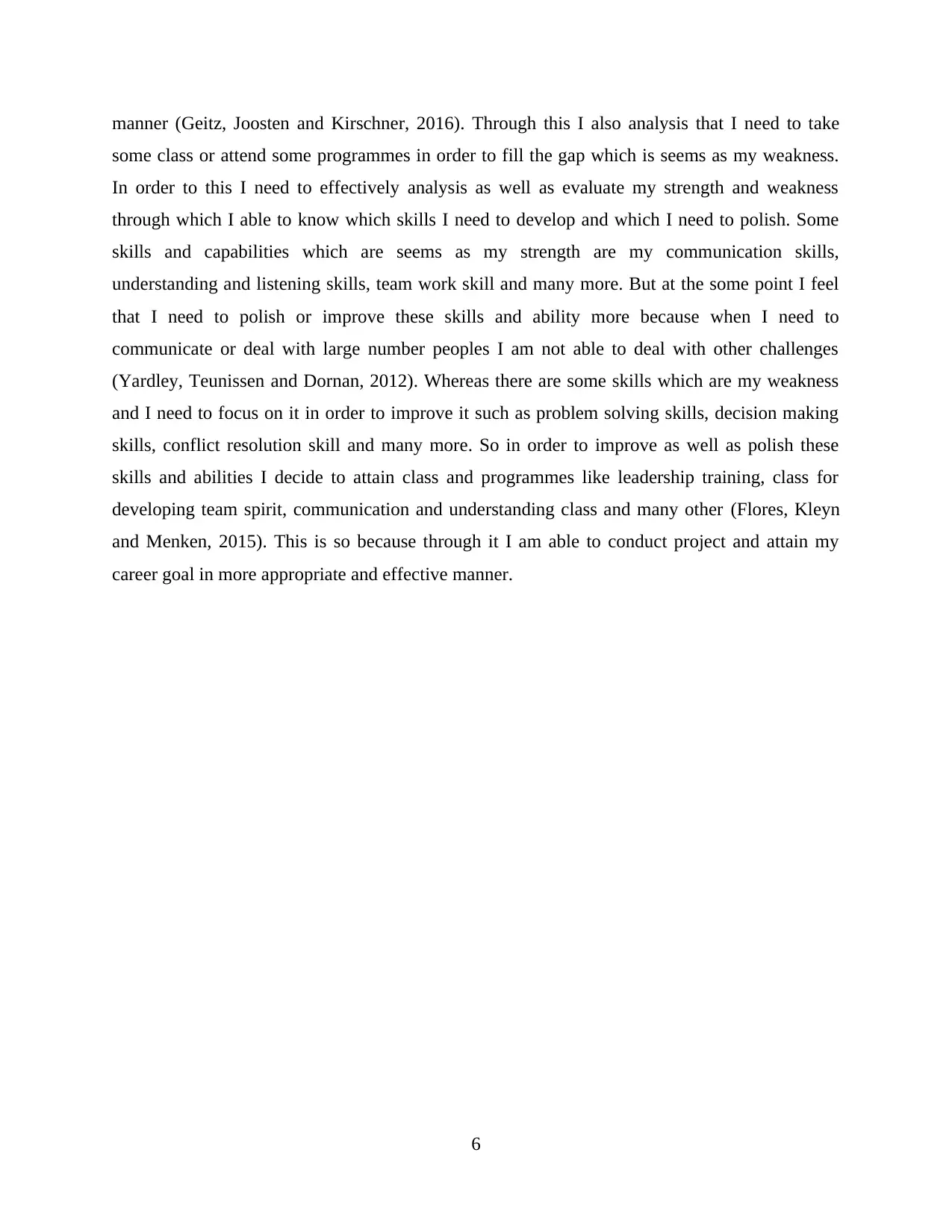
manner (Geitz, Joosten and Kirschner, 2016). Through this I also analysis that I need to take
some class or attend some programmes in order to fill the gap which is seems as my weakness.
In order to this I need to effectively analysis as well as evaluate my strength and weakness
through which I able to know which skills I need to develop and which I need to polish. Some
skills and capabilities which are seems as my strength are my communication skills,
understanding and listening skills, team work skill and many more. But at the some point I feel
that I need to polish or improve these skills and ability more because when I need to
communicate or deal with large number peoples I am not able to deal with other challenges
(Yardley, Teunissen and Dornan, 2012). Whereas there are some skills which are my weakness
and I need to focus on it in order to improve it such as problem solving skills, decision making
skills, conflict resolution skill and many more. So in order to improve as well as polish these
skills and abilities I decide to attain class and programmes like leadership training, class for
developing team spirit, communication and understanding class and many other (Flores, Kleyn
and Menken, 2015). This is so because through it I am able to conduct project and attain my
career goal in more appropriate and effective manner.
6
some class or attend some programmes in order to fill the gap which is seems as my weakness.
In order to this I need to effectively analysis as well as evaluate my strength and weakness
through which I able to know which skills I need to develop and which I need to polish. Some
skills and capabilities which are seems as my strength are my communication skills,
understanding and listening skills, team work skill and many more. But at the some point I feel
that I need to polish or improve these skills and ability more because when I need to
communicate or deal with large number peoples I am not able to deal with other challenges
(Yardley, Teunissen and Dornan, 2012). Whereas there are some skills which are my weakness
and I need to focus on it in order to improve it such as problem solving skills, decision making
skills, conflict resolution skill and many more. So in order to improve as well as polish these
skills and abilities I decide to attain class and programmes like leadership training, class for
developing team spirit, communication and understanding class and many other (Flores, Kleyn
and Menken, 2015). This is so because through it I am able to conduct project and attain my
career goal in more appropriate and effective manner.
6
⊘ This is a preview!⊘
Do you want full access?
Subscribe today to unlock all pages.

Trusted by 1+ million students worldwide
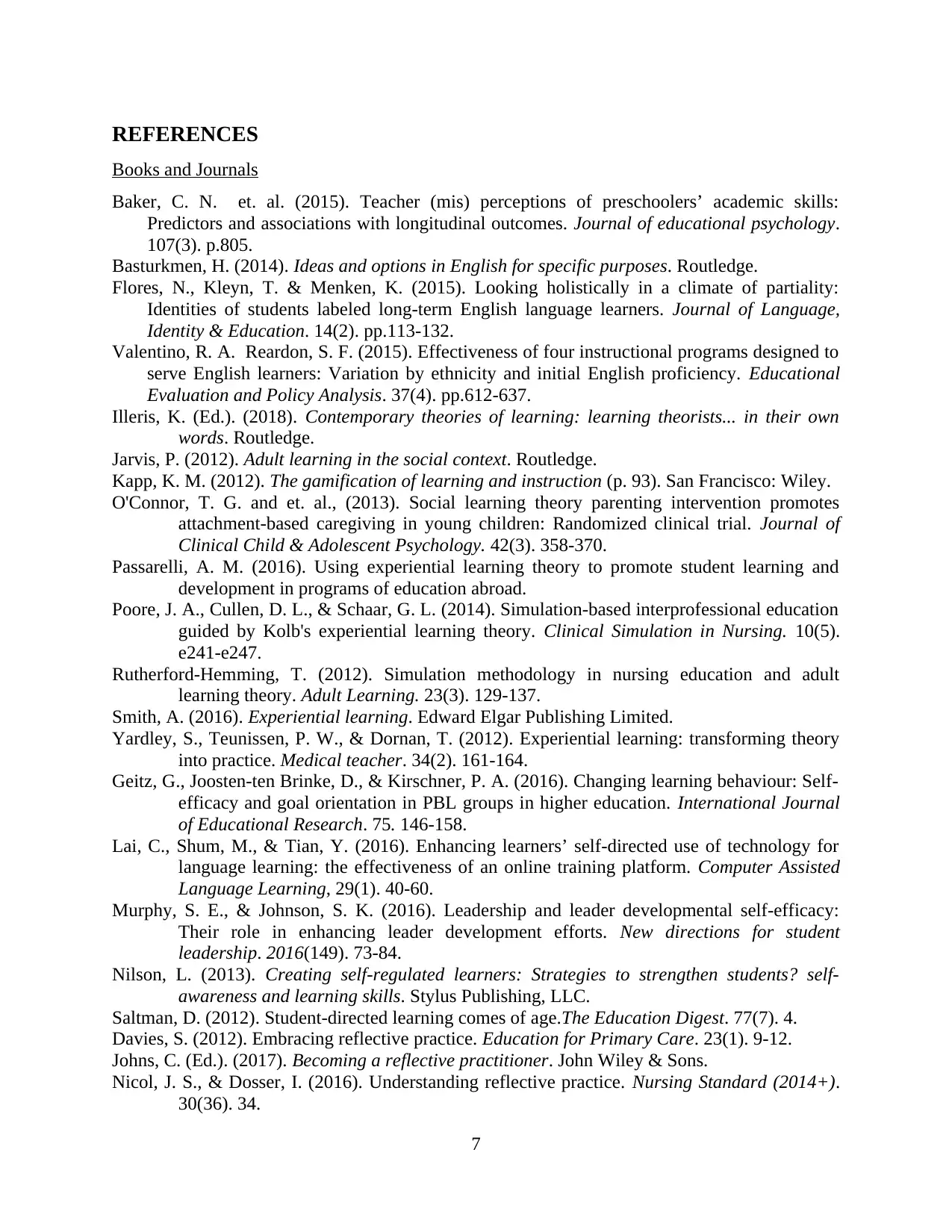
REFERENCES
Books and Journals
Baker, C. N. et. al. (2015). Teacher (mis) perceptions of preschoolers’ academic skills:
Predictors and associations with longitudinal outcomes. Journal of educational psychology.
107(3). p.805.
Basturkmen, H. (2014). Ideas and options in English for specific purposes. Routledge.
Flores, N., Kleyn, T. & Menken, K. (2015). Looking holistically in a climate of partiality:
Identities of students labeled long-term English language learners. Journal of Language,
Identity & Education. 14(2). pp.113-132.
Valentino, R. A. Reardon, S. F. (2015). Effectiveness of four instructional programs designed to
serve English learners: Variation by ethnicity and initial English proficiency. Educational
Evaluation and Policy Analysis. 37(4). pp.612-637.
Illeris, K. (Ed.). (2018). Contemporary theories of learning: learning theorists... in their own
words. Routledge.
Jarvis, P. (2012). Adult learning in the social context. Routledge.
Kapp, K. M. (2012). The gamification of learning and instruction (p. 93). San Francisco: Wiley.
O'Connor, T. G. and et. al., (2013). Social learning theory parenting intervention promotes
attachment-based caregiving in young children: Randomized clinical trial. Journal of
Clinical Child & Adolescent Psychology. 42(3). 358-370.
Passarelli, A. M. (2016). Using experiential learning theory to promote student learning and
development in programs of education abroad.
Poore, J. A., Cullen, D. L., & Schaar, G. L. (2014). Simulation-based interprofessional education
guided by Kolb's experiential learning theory. Clinical Simulation in Nursing. 10(5).
e241-e247.
Rutherford-Hemming, T. (2012). Simulation methodology in nursing education and adult
learning theory. Adult Learning. 23(3). 129-137.
Smith, A. (2016). Experiential learning. Edward Elgar Publishing Limited.
Yardley, S., Teunissen, P. W., & Dornan, T. (2012). Experiential learning: transforming theory
into practice. Medical teacher. 34(2). 161-164.
Geitz, G., Joosten-ten Brinke, D., & Kirschner, P. A. (2016). Changing learning behaviour: Self-
efficacy and goal orientation in PBL groups in higher education. International Journal
of Educational Research. 75. 146-158.
Lai, C., Shum, M., & Tian, Y. (2016). Enhancing learners’ self-directed use of technology for
language learning: the effectiveness of an online training platform. Computer Assisted
Language Learning, 29(1). 40-60.
Murphy, S. E., & Johnson, S. K. (2016). Leadership and leader developmental self‐efficacy:
Their role in enhancing leader development efforts. New directions for student
leadership. 2016(149). 73-84.
Nilson, L. (2013). Creating self-regulated learners: Strategies to strengthen students? self-
awareness and learning skills. Stylus Publishing, LLC.
Saltman, D. (2012). Student-directed learning comes of age.The Education Digest. 77(7). 4.
Davies, S. (2012). Embracing reflective practice. Education for Primary Care. 23(1). 9-12.
Johns, C. (Ed.). (2017). Becoming a reflective practitioner. John Wiley & Sons.
Nicol, J. S., & Dosser, I. (2016). Understanding reflective practice. Nursing Standard (2014+).
30(36). 34.
7
Books and Journals
Baker, C. N. et. al. (2015). Teacher (mis) perceptions of preschoolers’ academic skills:
Predictors and associations with longitudinal outcomes. Journal of educational psychology.
107(3). p.805.
Basturkmen, H. (2014). Ideas and options in English for specific purposes. Routledge.
Flores, N., Kleyn, T. & Menken, K. (2015). Looking holistically in a climate of partiality:
Identities of students labeled long-term English language learners. Journal of Language,
Identity & Education. 14(2). pp.113-132.
Valentino, R. A. Reardon, S. F. (2015). Effectiveness of four instructional programs designed to
serve English learners: Variation by ethnicity and initial English proficiency. Educational
Evaluation and Policy Analysis. 37(4). pp.612-637.
Illeris, K. (Ed.). (2018). Contemporary theories of learning: learning theorists... in their own
words. Routledge.
Jarvis, P. (2012). Adult learning in the social context. Routledge.
Kapp, K. M. (2012). The gamification of learning and instruction (p. 93). San Francisco: Wiley.
O'Connor, T. G. and et. al., (2013). Social learning theory parenting intervention promotes
attachment-based caregiving in young children: Randomized clinical trial. Journal of
Clinical Child & Adolescent Psychology. 42(3). 358-370.
Passarelli, A. M. (2016). Using experiential learning theory to promote student learning and
development in programs of education abroad.
Poore, J. A., Cullen, D. L., & Schaar, G. L. (2014). Simulation-based interprofessional education
guided by Kolb's experiential learning theory. Clinical Simulation in Nursing. 10(5).
e241-e247.
Rutherford-Hemming, T. (2012). Simulation methodology in nursing education and adult
learning theory. Adult Learning. 23(3). 129-137.
Smith, A. (2016). Experiential learning. Edward Elgar Publishing Limited.
Yardley, S., Teunissen, P. W., & Dornan, T. (2012). Experiential learning: transforming theory
into practice. Medical teacher. 34(2). 161-164.
Geitz, G., Joosten-ten Brinke, D., & Kirschner, P. A. (2016). Changing learning behaviour: Self-
efficacy and goal orientation in PBL groups in higher education. International Journal
of Educational Research. 75. 146-158.
Lai, C., Shum, M., & Tian, Y. (2016). Enhancing learners’ self-directed use of technology for
language learning: the effectiveness of an online training platform. Computer Assisted
Language Learning, 29(1). 40-60.
Murphy, S. E., & Johnson, S. K. (2016). Leadership and leader developmental self‐efficacy:
Their role in enhancing leader development efforts. New directions for student
leadership. 2016(149). 73-84.
Nilson, L. (2013). Creating self-regulated learners: Strategies to strengthen students? self-
awareness and learning skills. Stylus Publishing, LLC.
Saltman, D. (2012). Student-directed learning comes of age.The Education Digest. 77(7). 4.
Davies, S. (2012). Embracing reflective practice. Education for Primary Care. 23(1). 9-12.
Johns, C. (Ed.). (2017). Becoming a reflective practitioner. John Wiley & Sons.
Nicol, J. S., & Dosser, I. (2016). Understanding reflective practice. Nursing Standard (2014+).
30(36). 34.
7
Paraphrase This Document
Need a fresh take? Get an instant paraphrase of this document with our AI Paraphraser

8
1 out of 8
Related Documents
Your All-in-One AI-Powered Toolkit for Academic Success.
+13062052269
info@desklib.com
Available 24*7 on WhatsApp / Email
![[object Object]](/_next/static/media/star-bottom.7253800d.svg)
Unlock your academic potential
Copyright © 2020–2026 A2Z Services. All Rights Reserved. Developed and managed by ZUCOL.




